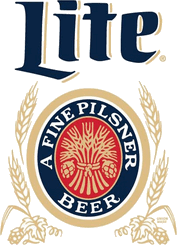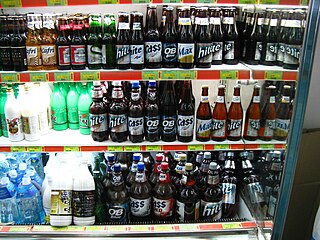
The Miller Brewing Company is an American brewery and beer company in Milwaukee, Wisconsin. It was founded in 1855 by Frederick Miller. Molson Coors acquired the full global brand portfolio of Miller Brewing Company in 2016, and operates the Miller Brewery at the site of the original Miller Brewing Company complex.

Pale lager is a very pale-to-golden-colored lager beer with a well-attenuated body and a varying degree of noble hop bitterness.

Miller Lite is a 4.2% ABV light American lager beer sold by Molson Coors of Chicago, Illinois. The company also produces Miller Genuine Draft and Miller High Life. Miller Lite competes mainly with Anheuser-Busch's Bud Light. Miller Lite is the official beer sponsor of the Green Bay Packers, Milwaukee Brewers, Milwaukee Bucks, Dallas Cowboys, Baltimore Ravens, Chicago Bears, and Bellator MMA.

The Pabst Brewing Company is an American company that dates its origins to a brewing company founded in 1844 by Jacob Best and was, by 1889, named after Frederick Pabst. It is currently a holding company which contracts the brewing of over two dozen brands of beer and malt liquor: these include its own flagship Pabst Blue Ribbon, as well as brands from now defunct breweries including:

Lucky Lager is an American lager with U.S. brewing and distribution rights held by the Pabst Brewing Company. Originally launched in 1934 by the San Francisco-based General Brewing Company, Lucky Lager grew to be one of the prominent beers of the Western United States during the 1950s and 1960s. In 2019, Pabst announced that the beer brand would be revived and would be brewed by 21st Amendment Brewery, a brewery based in San Leandro.

Beer, called maekju in Korean, was first introduced to Korea in the early 20th century. Seoul's first beer brewery opened in 1908. Two current major breweries date back to the 1930s. The third brewery established in Korea, Jinro Coors Brewery, was founded in the 1990s. It was later acquired by Oriental Breweries (OB). Hite Breweries's former name was Chosun Breweries, which was established in 1933. The company changed its name to Hite Breweries in 1998. OB Breweries established as Showa Kirin Breweries in 1933. The company changed its name to OB Breweries in 1995.
Joseph Lawrence Owades was an American biochemist and brewer of light and industrially produced beer. He adjusted analytical techniques and quality control, was involved in the development of the first modern light beer, creating many new, unique, and successful specialty beers. He is regarded by some as the father of light beer.
Light beer is a beer, usually a pale lager, that is reduced in alcohol content or in calories compared to regular beers. Light beers may be chosen by beer drinkers who wish to manage their alcohol consumption or their calorie intake; however, they are sometimes criticised for being less flavourful than full-strength beers, or for tasting or actually being watered down.

Oriental Brewery or OB is a South Korean brewery currently owned by AB InBev, and initially founded by Doosan Group.
George Killian's Irish Red is a red beer, produced and sold in France by Heineken France, and under license in the US by Molson Coors. Despite the differences in the brewing methods, the marketing of both beers claim legacy to an Irish "original recipe".

Rheingold Brewery was a New York state brewery which sold Rheingold Beer from 1883 to 1976. The brewery held 35% of the state's beer market at its peak. The company was sold by the founding Jewish American Liebmann family in 1963. According to The New York Times, "Rheingold Beer was once a top New York brew, guzzled regularly by a loyal cadre of workingmen, who would just as soon have eaten nails as drink another beer maker's suds." In 1966 it introduced Gablinger's Beer, one of the first reduced calorie beers, which was brewed using a process originated by chemist Dr. Hersch Gablinger of Basel, Switzerland.
Heineken N.V. is a Dutch brewer which owns a worldwide portfolio of over 170 beer brands, mainly pale lager, though some other beer styles are produced. The two largest brands are Heineken and Tecate; though the portfolio includes Amstel, Fosters, Sagres, Cruzcampo, Skopsko, Affligem, Żywiec, Starobrno, Zagorka, Zlatý Bažant, Laško and Birra Moretti.
SABMiller was one of the top five global brewing companies, and had a range of over 150 beers, including international beers such as Pilsner Urquell, and Miller Genuine Draft, and local ones such as Gambrinus and Castle Milk Stout.

American lager or North American lager is pale lager that is produced in the United States. The pale lager-style beer originated in Europe in the mid-19th century, and moved to the US with German immigrants. As a general trend outside of Bavaria and the Czech Republic where the beers may be firmly hopped, pale lager developed as a modestly hopped beer, and sometimes used adjuncts such as rice or corn – and this was also true in the US.
Anheuser-Busch, a wholly owned subsidiary of Anheuser-Busch InBev SA/NV, is the largest brewing company in the United States, with a market share of 45 percent in 2016.

The Christian Schmidt Brewing Company was an American brewing company headquartered in Philadelphia, Pennsylvania. Founded in 1860, it was the largest brewing company in the history of Philadelphia, producing nearly 4,000,000 barrels of beer a year in the late 1970s. When it closed in 1987, it marked the first time in over 300 years that there was no brewery operating in Philadelphia.

Kgalagadi Breweries (Pty) Limited are brewers based in Gaborone, Botswana. They produce lager beers, traditional beers, bottled water and soft drinks under license. The brewery started out as Prinz Brau, with two brands, Prinz Brau and Prinz Deluxe.

Milwaukee, Wisconsin, has one major brewery and dozens of microbreweries, and is home to several iconic beer brands from a variety of brewers. It has had an association with beer throughout its history, with the brewing industry getting its start prior to its official founding as a city and was nationally recognized as such by the end of the 19th century. This heritage can be found explicitly in its Major League Baseball team, the Milwaukee Brewers, and on recognizable beer brands such as Old Milwaukee and Milwaukee's Best. This recognition of Milwaukee as a brewing hub dates back to the early 20th century, and boasted the world's largest brewing capacity as late as 1981. The city is nationally recognized with the nickname "Brew City" due to its nearly two centuries of brewing heritage from multiple past major brewers including Miller Brewing Company, Pabst Brewing Company, and Joseph Schlitz Brewing Company. Today, through the ownership of MillerCoors, the city's largest brewery produces 10 million barrels of beer annually.












